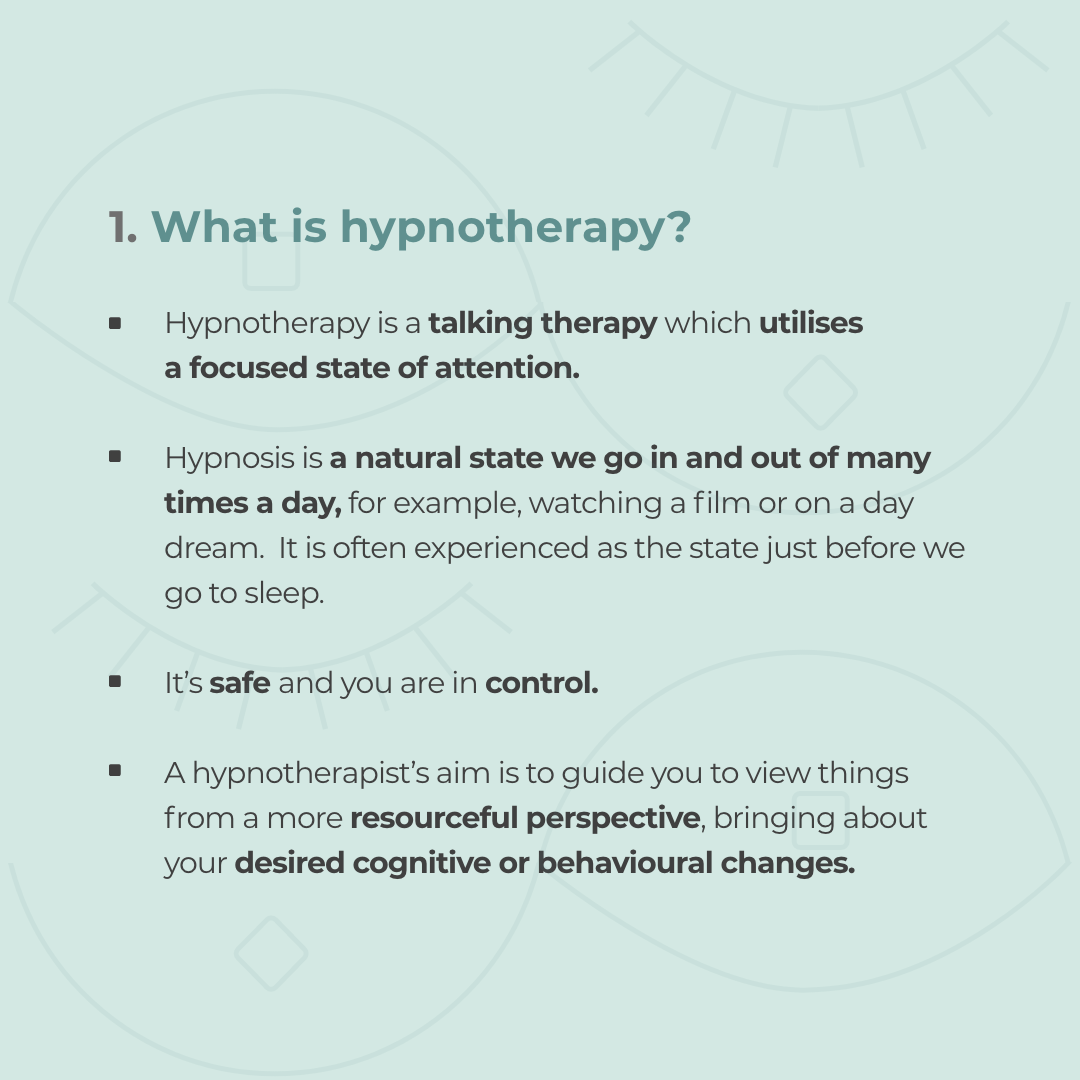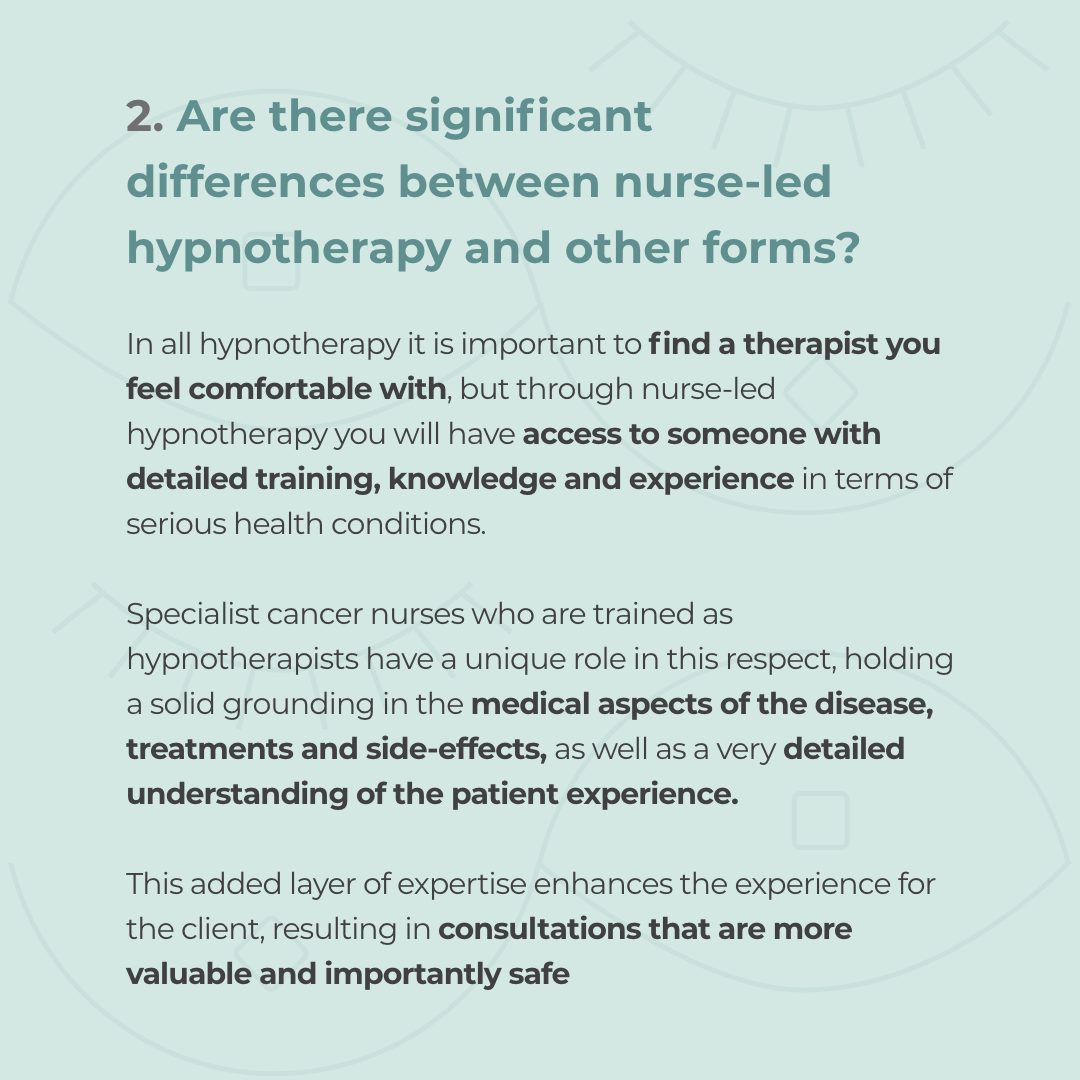
Key takeaways
- Hypnosis is a focused state of concentration. It is safe, relaxing and you are in control.
- Nurse-led hypnotherapy can have a positive effect on menopausal symptoms; the techniques have been shown to reduce the severity, frequency and length of flashes, as well as providing a sense of agency in the whole transition process.
- Attention to the breath and colour visualisation are two techniques used to ease the symptoms of menopause.
Perci Hypnotherapist Beverley Longhurst discusses how hypnotherapy can help manage menopausal symptoms and side effects caused by chemotherapy. As a Cancer Nurse Specialist with extensive experience in anti-hormone treatment, Beverley also provides information, support and advice, alongside clinical hypnotherapy.
Many cancer patients will find that transitioning to anti-hormone treatments is fairly straightforward, noticing no side effects, or finding that the side effects settle after a period of several weeks. Not all women experience debilitating symptoms and side effects.
Yet younger women experiencing menopausal symptoms can often experience sudden and marked side effects on some treatment regimes. It’s common for them to feel isolated; both out of kilter with their own peers, and having difficulty relating to common cancer peer support groups who are older and are at a different stage of life.
Issues such as fertility, dating or studying may be viewed from different perspectives. Symptoms such as hot flashes may be more pronounced with some treatment regimes due to the sudden decrease in estrogen. Many younger patients have disclosed to me a feeling of “this is not my time” to deal with these experiences, making it difficult to come to terms with. Whilst research has shown women younger than 40 are about 40% more likely to stop hormonal therapy early than women ages 50 to 65 (breastcancer.org).
While breast cancer in men is very rare (around 1%), the vast majority will be hormone receptor positive, requiring anti-hormone treatment. Being a small minority, in a predominantly female disease can contribute to some men feeling a mixture of shock, isolation and embarrassment when coming to terms with a diagnosis. Ongoing treatments like Tamoxifen can potentially add to this burden of feeling out of place and again, one study found that 20% of men stop Tamoxifen due to intolerable side effects (breastcancer.org).
Read more about chemotherapy induced menopause.
Menopausal symptoms and anxiety
There are many studies to suggest the frequency and severity of symptoms such as hot flashes are greatly influenced by anxiety. For example, women report that hot flashes cause feelings of embarrassment and vulnerability when experienced in public. Some women feel obliged to explain their hot flashes or symptoms, with some women avoiding meeting new people or attending certain social situations entirely.
In fact, some symptoms of menopause mimic symptoms of anxiety: sweaty palms, palpitations and feeling hot. Therefore anxiety about the flashes actually feeds the symptoms of the flashes themselves. When we think about the range of side effects that may be experienced with various hormone-related treatments, it’s understandable that these can also contribute to anxiety, including:

- Hot flashes and night sweats
- Weight gain
- Insomnia
- Decreased energy
- Aching joints
- Libido changes
- Breast pain and enlargement (in men)
What is hypnotherapy?
Hypnosis is a focused state of concentration, and one that we go in and out of many times a day – in a day dream, or listening to music for example. It is pleasant and relaxing.
In this relaxed state, hypnotherapy can help to change the rehearsed anxious thoughts or behaviours we may not even be aware of which are contributing to increased frequency and severity of flashes, to more flexible, adaptive ways of being.
What research has been done into hypnotherapy for menopause?
The North American Menopause Society promotes the use of clinical hypnotherapy for managing hot flashes as a non-hormonal treatment and there is some promising evidence in clinical studies.
In a study of 60 women with a history of breast cancer, clinical hypnosis was significantly better at reducing hot flashes and improving mood and sleep than no treatment. While a random controlled trial which took 187 postmenopausal women reporting at least 50 hot flashes a week at baseline, evaluated clinical hypnosis over 12 weeks against an active structured attention control. Participants in the clinical hypnosis arm reported significantly lower hot flash frequency (74% vs 17%) and hot flash scores (frequency x severity, 80% vs 15%). In addition, physiologically monitored hot flashes were reduced significantly more in the hypnosis group than in the attention control group (57% vs 10%) (menopause.org).
It’s interesting to note that in both trials, clinical hypnosis involved a course of weekly sessions (between 5 and 12) of hypnotherapy with at-home self-hypnosis practice. A course of hypnotherapy gives the best chance of improvement.
How can hypnotherapy help with menopause symptoms?
Nurse-led hypnotherapy can have a positive effect in creating a plan to support your needs, options and choices, while the techniques have been shown to reduce the severity, frequency and length of flashes, as well as providing a sense of agency in the whole transition process.

Being able to talk to someone who really understands your treatment and unique situation and preferences can alleviate anxiety in itself.
A course of hypnotherapy can leave you feeling more empowered and calm. It can also enable you to develop self-hypnosis techniques, which can help make you more aware of when flashes may occur and feel more prepared and in control in those moments. It can also explore and address some of the affiliated issues such loss of confidence, insomnia, low libido and low energy.
What techniques may be used in a hypnotherapy session?
- Developing awareness of symptoms and responding to them with controlled, relaxed breathing.
- Using ways to work with your inner thermostat and being able to reset your temperature using cooling imagery to access a cool feeling when needed.
- Lowering anxiety which may contribute to symptoms.
- Reinforcing a positive mindset to be able to deal with embarrassment, isolation and setbacks.
- Learning positive suggestions to redirect your focus for example to minimise the impact of flashes.
- Reframing the future as a time of increased empowerment and choice by developing and moving towards new goals and priorities.
- Developing patience and maintaining motivation to continue with desired goals such as diet and exercise plans, feeling confident in sensitive conversations or new relationships, or developing resilience with treatments (eg. hormone therapies).
What happens during a nurse-led hypnotherapy session?
About half of the consultation will be spent talking about your expectations and your current concerns. When we have spoken about what it is you would like to achieve, you will be led into a relaxed state. To do this I use guided imagery or storytelling, plus body and breath awareness.
Often this will be followed by suggestions for useful resources, distraction techniques or ways you can feel more resourceful in times of need. This may be done directly, indirectly or a mixture of the two. I will encourage you to be aware of your ability to feel relaxed, and your ability to change your thoughts and view things differently.
I then gently guide you out of the relaxation into a wakeful state.
Hypnotherapy is not a substitute for primary-care
Finally, it’s important to keep in contact with your GP or specialist team at this time. Don’t assume changes are a medication side effect or avoid medical support. They could be something else that can, or should, be treated or managed in another helpful way.
Find out more about Beverley Longhurst and her availability for hypnosis for menopause.
Here at Perci Health, we are here to support anyone that has been impacted by cancer. If you think you or your loved one could benefit from virtual access to high-quality cancer specialists, find out more about our support types or how we help those living with cancer.
While we have ensured that every article is medically reviewed and approved, information presented here is not intended to be a substitute for professional medical advice, diagnosis, or treatment. If you have any questions or concerns, please talk to one of our healthcare professionals or your primary healthcare team.
References
Breastcancer.org, “Many Younger Women Don’t Think Hormonal Therapy Is Necessary”. Feb 2016: https://www.breastcancer.org/research-news/younger-women-think-hormonal-therapy-unnecessary
Breatscancer.org, “Many Men Stop Taking Tamoxifen”. Nov 2011: https://www.breastcancer.org/research-news/20111117-2
Menopause: The Journal of The North American Menopause Society, “Nonhormonal management of menopause-associated vasomotor symptoms”. 2015: http://www.menopause.org/docs/default-source/professional/pap-pdf-meno-d-15-00241-minus-trim-cme.pdf